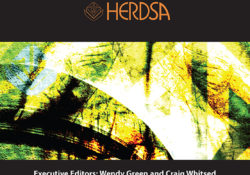
tandfonline.com har udgivet en rapport under søgningen “Teacher Education Mathematics”: ABSTRACT ABSTRACT One consequence of novice researchers studying methodology textbooks is confusion: philosophical terminology is complicated and sometimes poorly defined. Another consequence is that inexperienced researchers divide themselves into epistemological cliques, which can inhibit inter-disciplinary discussions. This is a particular problem in subjects, such as Information Science, that bridge disciplines. This article attempts to address these issues by seeking ground common to researchers, regardless of their philosophical standpoint. It identifies several ‘tools of the mind’ which are expanded on and discussed. By becoming familiar with these tools, inexperienced researchers can gain practical insights that create context for philosophical terms they later encounter. ‘Tools of the mind’ discussed are captured in the following questions: What should I research? How do I… Continue Reading →
Like this:
Like Loading...
eric.ed.gov har udgivet: The aim of the “Tools of the Mind” prekindergarten curriculum is to enhance children’s executive function skills within an instructional context that promotes the basic academic and social skills that prepare them for kindergarten and beyond. To investigate the effectiveness of “Tools” in achieving this aim, the authors are conducting a longitudinal randomized experiment to answer the following questions: (1) Do children in “Tools of the Mind” classrooms improve more in literacy, math, social skills, and behavior problems during the preschool year than children in “business as usual” control classrooms? Are those gains sustained through kindergarten and first grade?; (2) Do children in “Tools of the Mind” classrooms show greater gains in executive function than children in the control classrooms? Do those gains mediate the curriculum effects… Continue Reading →
Like this:
Like Loading...
eric.ed.gov har udgivet: The article contains general information about the use of specialized mathematics software in the preparation of math teachers. The authors indicate the reasons to study the mathematics software. In particular, they analyze the possibility of presenting basic mathematical courses using mathematical computer tools from both a teacher and a student, argue in favour of using software instead of traditional paper-and-board style. The special course of the study of mathematics software (main tasks of the course are disclosed; knowledge and skills that students should possess on completion of their studies are dedicated; content of computer workshop is detailed) is briefly described. Also the authors give a detailed solution and its methodic basis of typical problem with the use of the SCM Maple. The typical errors which made by… Continue Reading →
Like this:
Like Loading...
tandfonline.com har udgivet en rapport under søgningen “Teacher Education Mathematics”: ABSTRACT ABSTRACT The aim of this research is to highlight didactical voices on inclusive ideals and special educational tools noted in the written reflections of 178 preschool teachers in 10 Swedish municipalities. The research questions are as follows: How do preschool teachers signify inclusive ideals in written reflections of teaching in language and communication in preschools? Which special educational tools emerge in the written reflections about teaching in language and communication in preschool, and how are these tools said to be used? The material was analysed with multi-voiced didactic modelling and didactical tact as a theoretical base. The results show that there are didactical voices on inclusion in the analysed material. The core foundation of the teaching appears to be… Continue Reading →
Like this:
Like Loading...
eric.ed.gov har udgivet: The current study investigated the predictive utility among teacher-rated, observed, and directly assessed behavioral self-regulation skills to academic achievement in preschoolers. Specifically, this study compared how a teacher report, the Child Behavior Rating Scale, an observer report, the Observed Child Engagement Scale, and a direct assessment, the Head-Toes-Knees-Shoulders task, relate to early math and literacy skills. The sample consisted of 247 children from 31 preschool classrooms. Trained research assistants observed a subsample of 104 children. Results indicated significant, positive relationships for teacher-rated and directly assessed behavioral self-regulation for early math and literacy skills. Teacher ratings were the strongest predictors of literacy, and the direct assessment emerged as the strongest predictor of math. Observed behavioral self-regulation was not significantly related to either academic domain. Discussion focuses on domain… Continue Reading →
Like this:
Like Loading...
eric.ed.gov har udgivet: This single subject design study (ABAB) investigated the effects of using iPads[R] in a classwide academic intervention to increase independent task completion and basic math skills of seven students diagnosed with autism spectrum disorders (ASD) enrolled in a special education school for students with moderate to severe disabilities. An additional purpose of the study was to identify the advantages of and challenges to using iPads[R] for classroom instruction. Traditional basic math instruction was used for the baseline phase, while a basic math skill app on an iPad[R] was used for the intervention phase. Math probes were completed and the results recorded for four to five sessions for each of the four weeks of the study. Data on level of teacher prompting and presence of noncompliant behaviors were… Continue Reading →
Like this:
Like Loading...
tandfonline.com har udgivet en rapport under søgningen “Teacher Education Mathematics”: Production and uses of e-learning tools for animal biology education at university Link til kilde
Like this:
Like Loading...
tandfonline.com har udgivet en rapport under søgningen “Teacher Education Mathematics”: ABSTRACT ABSTRACT In this response paper to Hoyles’ contribution “Transforming the mathematical practices of learners and teachers through digital technology” focuses on three points. First, more knowledge is needed on why teaching and learning practices should transform, into what will they transform, and by what or by whom will they be transformed. Second, a suggestion is made for a more specific taxonomy on the didactical functionality of digital tools in mathematics education. Third, a plea is made for a future research agenda that addresses the ways in which activities with digital tools mediate the learning of mathematics in a fruitful way. This includes the interpretation and grading of online student work through intelligent mathematical software, and the notion of embodiment,… Continue Reading →
Like this:
Like Loading...



